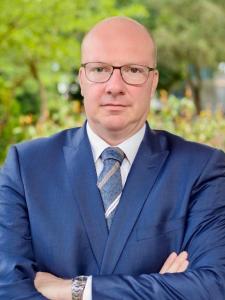At the beginning, Nils Wörmer, Director of RP SIPODI East Africa, welcomed Heiko Nitzschke, German Special Envoy to the Horn of Africa, and Hans von Schröder, Deputy Ambassador of the Federal Republic of Germany in Uganda, as well as Anna Reismann, Director of the KAS Foundation Office Uganda and South Sudan. In his brief introduction to the topic of the evening, Nils Wörmer emphasised the political relevance of Uganda for the Horn of Africa. Then Haggai Matsiko, freelance journalist, and Edgar Mwine, Project Officer at RP SIPODI East Africa, gave a detailed overview of Uganda's foreign policy, focusing on the security challenges in Sudan and Somalia. Subsequently, Heiko Nitzschke deepened the discussion on Ugandan foreign policy and its impact on East African countries. This was followed by an interesting exchange with the other experts Eynas Mohamed Latif, Teeba Press, and Godwin Toko, from the Agora Center for Research.
The discussion focused on Uganda's influence in the crisis areas of Sudan and Somalia and the role of international actors in the countries domestic and foreign policy. Uganda's significance for the region has changed considerably in recent years. Nevertheless, the country could play a significant role in dealing with the conflict in Sudan by influencing decisions in the UN Security Council through its position in the African Union (AU). Furthermore, the participants discussed the future development of the situation in Somalia. A focus was set on the development of the newly established AU Support and Stabilization Mission in Somalia (AUSSOM) and the new troop configurations, with a particular interest in Uganda's expected contribution in providing military forces. One of the possible end scenarios for the crisis in Somalia mentioned was the Afghanistan scenario.
Finally, the discussion turned to the challenges of international cooperation between Europe and Uganda. While the long-standing relations between the political West and Uganda are conducted in a more classic diplomatic manner, other global actors, such as Russia and China, are increasingly engaging with Uganda through less transparent methods. This evolving approach complicates the ability of other stakeholders to assess the dynamics of these international interactions.
In the context of Uganda’s foreign policy, also the role of Muhoozi Kainerugaba, the Chief of Defence Forces of the Uganda People's Defence Forces (UPDF) and son of President Museveni, plays an important role. Kainerugaba undertakes numerous diplomatic trips to partner countries for Uganda's foreign policy affairs.
During the symposium, an intensive exchange took place between Heiko Nitzschke and the experts. This provided comprehensive answers to questions from both sides and gave new insights into the complex security situation in the Horn of Africa. To conclude the event, Nils Wörmer thanked everyone for their participation and invited the guests to continue their discussions at the reception afterwards.
About this series
The Konrad-Adenauer-Stiftung, its educational institutions, centres and foreign offices, offer several thousand events on various subjects each year. We provide up to date and exclusive reports on selected conferences, events and symposia at www.kas.de. In addition to a summary of the contents, you can also find additional material such as pictures, speeches, videos or audio clips.






